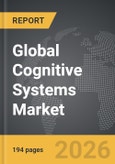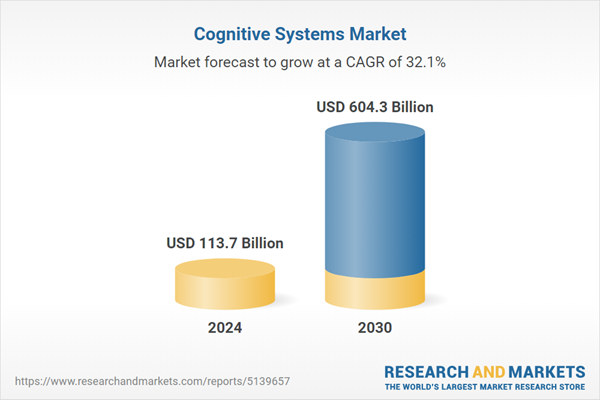Global Cognitive Systems Market - Key Trends and Drivers Summarized
What Are Cognitive Systems and Why Are They Transforming Industries?
Cognitive systems represent the next evolution of artificial intelligence (AI), combining advanced algorithms, machine learning (ML), and natural language processing (NLP) to mimic human thought processes. Unlike traditional computing systems, which operate based on predefined instructions and static programming, cognitive systems can learn from vast datasets, reason through complex problems, and adapt over time. These systems are designed to understand, interpret, and generate solutions that align with human cognition, making them capable of handling more complex, nuanced tasks. Industries such as healthcare, finance, and retail are increasingly adopting cognitive systems to enhance decision-making, streamline operations, and personalize services. For instance, in healthcare, cognitive systems can assist doctors by analyzing medical records and research papers to suggest diagnoses or treatment plans. In finance, they help detect fraudulent transactions and make real-time trading decisions. By integrating human-like learning and problem-solving capabilities, cognitive systems are reshaping how organizations operate, offering a more dynamic and intelligent approach to problem-solving.How Are Cognitive Systems Reshaping Decision-Making and Business Operations?
Cognitive systems are transforming decision-making processes across various industries by providing businesses with deeper, data-driven insights and the ability to predict future trends. These systems excel at analyzing large datasets in real-time, offering recommendations and insights that would be impossible for humans to process in the same time frame. In retail, for example, cognitive systems are used to analyze consumer behavior patterns, helping businesses to predict customer preferences and optimize inventory management. In marketing, these systems enhance personalization efforts by using machine learning to track and analyze customer interactions across various channels, making it easier to deliver targeted advertisements. Furthermore, cognitive systems improve operational efficiency by automating complex processes, such as supply chain optimization or regulatory compliance. In sectors like manufacturing, cognitive systems can identify production bottlenecks or predict machine failures before they happen, significantly reducing downtime and enhancing productivity. The ability to make informed, real-time decisions based on predictive insights is one of the core advantages driving the widespread adoption of cognitive systems.What Key Technologies and Innovations Are Powering Cognitive Systems?
At the core of cognitive systems are several advanced technologies, including natural language processing (NLP), machine learning (ML), and deep learning, all of which empower these systems to process and understand complex data. NLP allows cognitive systems to interpret and respond to human language, enabling a wide range of applications from virtual assistants and chatbots to sophisticated data analysis tools. Machine learning is another critical component, enabling systems to learn from data inputs and improve performance without being explicitly programmed for every task. Through ML, cognitive systems can recognize patterns and trends that enable them to forecast outcomes, automate decision-making, and optimize processes. Deep learning, a subset of machine learning, enhances these capabilities by using neural networks to simulate the human brain's decision-making process. The continuous evolution of these technologies is further supported by advancements in cloud computing and big data analytics, which provide the necessary infrastructure and computational power for cognitive systems to scale across industries. These innovations are also enabling cognitive systems to integrate with other emerging technologies, such as the Internet of Things (IoT) and augmented reality, offering even more dynamic and responsive solutions across various business sectors.What Are the Key Growth Drivers in the Cognitive Systems Market?
The growth in the cognitive systems market is driven by several factors, including the increasing need for advanced analytics, the rise of AI integration across industries, and growing consumer expectations for personalized experiences. As organizations deal with massive amounts of structured and unstructured data, cognitive systems provide the analytical tools to derive actionable insights in real-time, giving businesses a competitive edge. The rise of AI integration, especially in sectors like healthcare, retail, and finance, is another critical driver. Businesses are increasingly turning to cognitive systems to automate decision-making processes, enhance operational efficiency, and optimize resource management. For example, in healthcare, cognitive systems are being used for more accurate diagnostic tools and personalized treatment plans. Consumer behavior also plays a significant role in driving growth. The demand for personalized, seamless experiences is prompting companies to adopt cognitive systems that can tailor products, services, and interactions based on individual preferences and behavior patterns. Furthermore, the proliferation of IoT devices and smart technologies is expanding the use cases for cognitive systems in areas like smart cities, predictive maintenance, and connected vehicles. Regulatory changes that emphasize data security and compliance are further pushing industries to adopt cognitive systems capable of managing risk, ensuring data privacy, and handling complex compliance requirements. Together, these factors are fueling the adoption of cognitive systems as businesses seek more intelligent, adaptable solutions to meet the challenges of the modern digital landscape.Report Scope
The report analyzes the Cognitive Systems market, presented in terms of market value (USD). The analysis covers the key segments and geographic regions outlined below.- Segments: Product Type (Software, Hardware, Services); End-Use (Banking, Retail, Healthcare, Other End-Uses).
- Geographic Regions/Countries: World; United States; Canada; Japan; China; Europe (France; Germany; Italy; United Kingdom; and Rest of Europe); Asia-Pacific; Rest of World.
Key Insights:
- Market Growth: Understand the significant growth trajectory of the Software segment, which is expected to reach US$214.8 Billion by 2030 with a CAGR of 27.2%. The Hardware segment is also set to grow at 32.9% CAGR over the analysis period.
- Regional Analysis: Gain insights into the U.S. market, valued at $33.7 Billion in 2024, and China, forecasted to grow at an impressive 31.1% CAGR to reach $90.8 Billion by 2030. Discover growth trends in other key regions, including Japan, Canada, Germany, and the Asia-Pacific.
Why You Should Buy This Report:
- Detailed Market Analysis: Access a thorough analysis of the Global Cognitive Systems Market, covering all major geographic regions and market segments.
- Competitive Insights: Get an overview of the competitive landscape, including the market presence of major players across different geographies.
- Future Trends and Drivers: Understand the key trends and drivers shaping the future of the Global Cognitive Systems Market.
- Actionable Insights: Benefit from actionable insights that can help you identify new revenue opportunities and make strategic business decisions.
Key Questions Answered:
- How is the Global Cognitive Systems Market expected to evolve by 2030?
- What are the main drivers and restraints affecting the market?
- Which market segments will grow the most over the forecast period?
- How will market shares for different regions and segments change by 2030?
- Who are the leading players in the market, and what are their prospects?
Report Features:
- Comprehensive Market Data: Independent analysis of annual sales and market forecasts in US$ Million from 2024 to 2030.
- In-Depth Regional Analysis: Detailed insights into key markets, including the U.S., China, Japan, Canada, Europe, Asia-Pacific, Latin America, Middle East, and Africa.
- Company Profiles: Coverage of players such as Cognitive Systems Corp., IBM Corporation, Microsoft Corporation, Sirma Solutions JSC, UssCyber and more.
- Complimentary Updates: Receive free report updates for one year to keep you informed of the latest market developments.
Some of the 41 companies featured in this Cognitive Systems market report include:
- Cognitive Systems Corp.
- IBM Corporation
- Microsoft Corporation
- Sirma Solutions JSC
- UssCyber
- WebTech Innovation
This edition integrates the latest global trade and economic shifts into comprehensive market analysis. Key updates include:
- Tariff and Trade Impact: Insights into global tariff negotiations across 180+ countries, with analysis of supply chain turbulence, sourcing disruptions, and geographic realignment. Special focus on 2025 as a pivotal year for trade tensions, including updated perspectives on the Trump-era tariffs.
- Adjusted Forecasts and Analytics: Revised global and regional market forecasts through 2030, incorporating tariff effects, economic uncertainty, and structural changes in globalization. Includes historical analysis from 2015 to 2023.
- Strategic Market Dynamics: Evaluation of revised market prospects, regional outlooks, and key economic indicators such as population and urbanization trends.
- Innovation & Technology Trends: Latest developments in product and process innovation, emerging technologies, and key industry drivers shaping the competitive landscape.
- Competitive Intelligence: Updated global market share estimates for 2025, competitive positioning of major players (Strong/Active/Niche/Trivial), and refined focus on leading global brands and core players.
- Expert Insight & Commentary: Strategic analysis from economists, trade experts, and domain specialists to contextualize market shifts and identify emerging opportunities.
Table of Contents
Companies Mentioned (Partial List)
A selection of companies mentioned in this report includes, but is not limited to:
- Cognitive Systems Corp.
- IBM Corporation
- Microsoft Corporation
- Sirma Solutions JSC
- UssCyber
- WebTech Innovation
Table Information
| Report Attribute | Details |
|---|---|
| No. of Pages | 194 |
| Published | January 2026 |
| Forecast Period | 2024 - 2030 |
| Estimated Market Value ( USD | $ 113.7 Billion |
| Forecasted Market Value ( USD | $ 604.3 Billion |
| Compound Annual Growth Rate | 32.1% |
| Regions Covered | Global |









